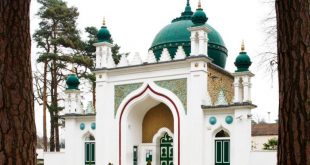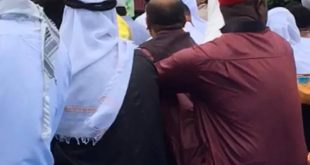Security experts express fears for regionРђЎs stability amid record weapons sales from west and RussiaРђЎs missile deal with Iran
 The Middle East is plunging deeper into an arms race, with an estimated $18bn expected to be spent on weapons this year, a development that experts warn is fuelling serious tension and conflict in the region.
The Middle East is plunging deeper into an arms race, with an estimated $18bn expected to be spent on weapons this year, a development that experts warn is fuelling serious tension and conflict in the region.
Given the unprecedented levels of weapon sales by the west (including the US, Canada and the UK) to the mainly Sunni Gulf states, Vladimir PutinРђЎs decision last week to allow thecontroversial delivery of S-300 anti-aircraft missiles to Iran РђЊ voluntarily blocked by Russia since 2010 РђЊ seems likely to accelerate the proliferation.
That will see agreed arms sales to the top five purchasers in the region – Saudi Arabia, the United Arab Emirates, Algeria, Egypt and Iraq РђЊ surge this year to more than $18bn, up from $12bn last year. Among the systems being purchased are jet fighters, missiles, armoured vehicles, drones and helicopters.
The Russian declaration came only two days before IraqРђЎs prime minister, Haider al-Abadi, disclosed that he was seeking arms worth billions of dollars from Washington РђЊ with payment deferred РђЊ for the battle against Islamic State (Isis).
Last week FranceРђЎs foreign minister, Laurent Fabius, disclosed progress in talks to sell Rafale fighter jets to the UAE, one of the Middle EastРђЎs biggest and most aggressive arms buyers.
With conflicts raging in Syria, Iraq, Libya and Yemen, and with Egypt also battling Islamist extremists in the Sinai, the signs that Russia is preparing to increase its own arms sales РђЊ and to the Gulf statesРђЎ biggest rival, Iran РђЊ are raising fears that tensions will be stoked further still. In particular, Saudi Arabia and Iran are facing off in the conflict in Yemen where, despite the announcement by Riyadh on Tuesday that it had halted its month-long bombing campaign, jets continued to strike Houthi rebel positions close to the capital Sanaa, around the third city Taez, and in the central town of Yarim.
According to the New York Times, defence industry officials have notified Congress that they are expecting additional requests from Arab states fighting Isis РђЊ Saudi Arabia, the UAE, Qatar, Bahrain, Jordan and Egypt РђЊ for thousands of new US-made weapons, including missiles and bombs, to rebuild depleted arms stockpiles.
Ironically, among the key weapons suppliers in the arms race are permanent members of the UN security council who have been at the centre of two unconventional arms control initiatives РђЊ disarming the Syrian governmentРђЎs stockpiles of chemical weapons and negotiating for a deal on IranРђЎs nuclear programme.
The scale of the arms race was revealed this year in reports published by IHS JaneРђЎs Global Defence Trade Reportand the Stockholm International Peace Research Institute (Sipri). They showed how Saudi Arabia had become the worldРђЎs largest importer of weapons and fourth largest military spender and that other Middle East states were sharply increasing their arms purchases.
Adding to the concern is the fact that the spending spree on arms comes against the background of a marked increase in military interventions by countries in the region since the Arab spring in 2011. Saudi Arabia has intervened in Bahrain (at the request of that kingdomРђЎs ruler during the so-called Pearl revolution), in Yemen in 2009 and again in Yemen this year.
 Komashisha
Komashisha




